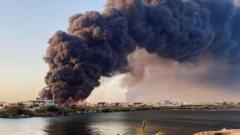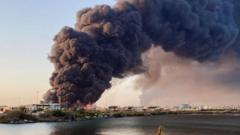In a significant move to assist Syria's recovery from a lengthy civil war, Saudi Arabia and Qatar have agreed to pay off Syria's $15 million debt to the World Bank. This financial commitment is poised to unlock access to vital aid and support for the new Syrian government, which is grappling with the daunting task of economic reconstruction.
Saudi Arabia and Qatar Provide Relief for Syria's Economic Recovery

Saudi Arabia and Qatar Provide Relief for Syria's Economic Recovery
Saudi Arabia and Qatar have pledged to pay off Syria’s World Bank debt, facilitating crucial economic support.
The funds are intended not only to resume World Bank activities in Syria—stalled for over 14 years—but also to provide financial and technical assistance essential for rebuilding the nation’s war-torn infrastructure. The Syrian Foreign Ministry expressed "deep gratitude" for this support, which it views as a gateway to enhancing cooperation with international institutions.
Despite these developments, the Syrian economy faces immense challenges, with over 90 percent of the population living in poverty, and significant unemployment affecting a quarter of the populace, as reported by the United Nations. The country’s currency has seen a drastic decline in value, falling from 50 Syrian pounds to the U.S. dollar before the war to around 15,000 post-conflict.
With the collapse of Bashar al-Assad's regime in December, new leadership from rebel factions has taken over the governance of Syria. However, policies introduced by these new leaders have exacerbated the economic hardship faced by average Syrians. Citizens routinely wait in long lines at banks, and many public subsidies have been cut, resulting in growing discontent.
Initial optimism regarding the lifting of Western sanctions against Syria has faded, as ongoing sanctions imposed in response to Assad's regime still affect the chance for economic recovery. Some easing of sanctions by the EU and Britain has been noted, and a six-month U.S. general license has offered a slight reprieve. However, the future remains uncertain as the country continues its struggle for stability and recovery.
Despite these developments, the Syrian economy faces immense challenges, with over 90 percent of the population living in poverty, and significant unemployment affecting a quarter of the populace, as reported by the United Nations. The country’s currency has seen a drastic decline in value, falling from 50 Syrian pounds to the U.S. dollar before the war to around 15,000 post-conflict.
With the collapse of Bashar al-Assad's regime in December, new leadership from rebel factions has taken over the governance of Syria. However, policies introduced by these new leaders have exacerbated the economic hardship faced by average Syrians. Citizens routinely wait in long lines at banks, and many public subsidies have been cut, resulting in growing discontent.
Initial optimism regarding the lifting of Western sanctions against Syria has faded, as ongoing sanctions imposed in response to Assad's regime still affect the chance for economic recovery. Some easing of sanctions by the EU and Britain has been noted, and a six-month U.S. general license has offered a slight reprieve. However, the future remains uncertain as the country continues its struggle for stability and recovery.






















